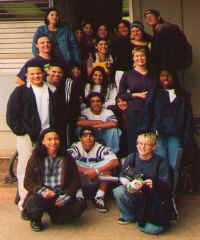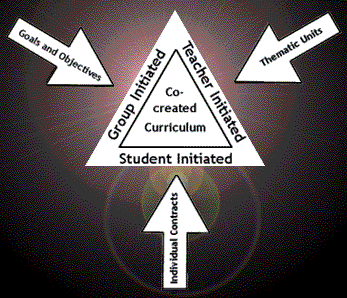|
| |


The Learning Community
provides a holistic education

Student Contracts
Each student writes a learning contract in which (s)he commits to read, write,
and do action projects to fulfill requirements for all classes taken in The Learning
Community. After the contract is reviewed and approved by the teacher, the student begins
the individualized portion of his/her work or joins with other students to pursue common
interests in out-of-class study groups.
As the student discovers resources -- books, topics, PBS specials, community
leaders, exciting places in which to learn, etc. -- (s)he brings these ideas to the
attention of his/her peers in weekly community meetings and may offer to share these
activities during class time as student initiated seminars (SIS).
Presentations, discussions, debates, guests speakers, creative projects,
community action projects may result from these suggestions.

Group Decision Making
The group of twenty-five students meets four periods a day to build a
supportive community of learners. Each member shares his/her interests and resources; then
the entire group works as a team to formulate objectives, group goals, and study themes.
As the students' collective vision becomes clear, they plan and organize group learning
activities that enhance their individual studies and expand their learning opportunities
beyond the limits of their individual imaginations.
Community meetings become events in which goals and objectives are converted
into realities -- such as stimulating discussions, talks by local professionals or
activists, and opportunities to learn by serving the local or global community.

Teacher Contribution
The teacher's role is transformed in The Learning Community. Traditionally,
teachers are trained as subject matter experts and classroom management professionals.
Teachers can also be group process catalysts, organizational development facilitators,
creators of interdisciplinary thematic units, and learners along with the students.
Our teacher brings his specialties into the weekly learning experience in the
form of topical seminars on world issues, electronic publishing, field experiences in
ecology, and workshops in the study of human consciousness.

A co-created curriculum

The group's shared experience is created by the student, the
group, and the teacher. Students share exciting discoveries that they make while pursuing
their contracts. The group engages in a goal-setting process that produces a collective
vision and a rich set of calendar activities. The teacher assists the group in becoming
autonomous and offers thematic units that are connected to local and global issues.
The progressive nature of the program's curriculum offers
opportunities for increasing awareness, observing patterns, developing strategies for
change, and participating in the creative process. Below is a three-week sample calendar
showing how the program could be designed.
|
Monday
|
Tuesday
|
Wednesday
|
Thursday
|
Friday
|
Week 1:
8:15 a.m.
to
noon
|
Community Meeting:
Explore Group goals and vision
Watch and discuss Global Warming video
|
Human rights speaker from Amnesty International
Seminar:
Personality & habit patterns
|
Speaker From Homeless Advocates on volunteering
Writing Lab:
Develop Oral Histories for the web site
|
Discussion & Hike:
Ecology of the SF bay region/field trip to Jasper Ridge Biological Reserve
|
Group Process:
personal support system
Cooperative Games
Cultural Food Fair & presentations
|
Week 2:
8:15 a.m.
to
noon
|
Field trip to the Adventures Ropes Course:
teamwork and confidence building
|
Presentation on Native American traditions
Student Initiated Seminar (SIS):
musical jam session
|
Community Meeting:
Plan fund raisers & coming events
Speaker and film: Rain forest depletion
|
Information, Public relations, propaganda and knowing the difference
Psych Seminar:
Dream symbolism
|
Videotape:
The Burning Times followed by discussion of feminism
SIS:
Creative media & mask making
|
Week 3:
8:15 a.m.
to
noon
|
Contemporary issues seminar: Defining the underlying ethical principles
Observer Superior Court session, meet with presiding judge
|
Community Meeting: Develop a three week calendar & fund raisers
Kids-teach-kids: Present environmental units to elementary students
|
Film:
Kurosawa's Ran, a Japanese epic
Discussion: Compare
Ran to Shakespeare's King Lear
|
Begin planning book publishing project
Group Process:
Personal and group problem solving
|
Discuss research on local deforestation
Plant oak trees in the Stanford foothills
|

For more information contact:
Program Coordinator
Gary Bacon, Ph.D.
|
![]()